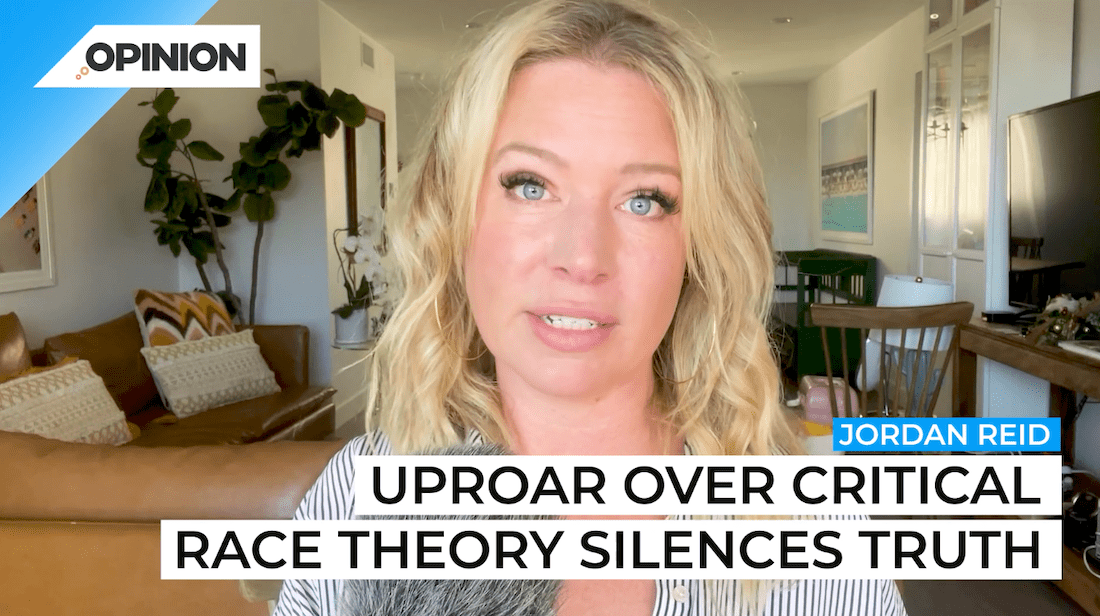
Commentary
-
Our commentary partners will help you reach your own conclusions on complex topics.
Lately there have been a ton of stories in the news about white parents arguing against the inclusion of critical race theory in public school curriculums.
Senate Republicans introduced a bill condemning any attempts to require teachers to be trained in CRT, Trump obviously rails against CRT all the time — because he’s racist.
First, let’s be clear. Critical race theory is this very specific academic approach that views history through the lens of systemic racism.
It’s also not really being taught in public schools. It’s not like teachers are interrupting math class to say, Hey, how does systemic racism factor into this equation?
What is happening is that educators are correctly increasingly looking at the omissions and factual inaccuracies that have been fed to kids for decades.
I mean, when I was in school, sure. I learned about slavery, but it was pretty whitewashed – pun entirely intended. And I was also taught, you know, the civil rights movement basically fixed it right? No.
Our country has a horrifying history of racial inequality and many of our nation’s institutions still work implicitly or explicitly to preserve the dominance of white people, especially white men. This is important stuff to know. Educators are also increasingly trying to introduce more works by people of color into the curriculum. Great, different perspectives. I love it.
One of the ideas that I hear being brought up by white parents who oppose teachers addressing the entrenchment of racist ideologies in our country’s history is that these teachings are making their children feel bad. They feel badly about themselves. They’re allegedly running home crying, “Mommy, if I’m a white man, does that make me a bad person?”
Um, first I would just like to acknowledge that it’s not like these same parents are concerned about their children’s black classmates learning from history and life every time they step out the door to feel badly about themselves. But I digress.
You know, my son, who is a white man or white boy at this point, asked me a similar question when I tried to talk to him about our country’s history of oppressing people of color in favor of white male dominance. And he wanted to know because he will grow into a white man: Does that mean that he is bad? And you know, he’s young and it’s a good question. And so I tried to answer him honestly, and instead of rushing to the school board to demand that they strike any mention of racial inequality from the curriculum.
Here’s what I said to him. I told my son that being born a white man does not make you bad, but it does make you responsible, not for our country’s history, but for its future. Because being born a white man is like starting a relay race in the second lap. You’re already way ahead. And it is important that you take responsibility for that simple fact of privilege, not so that you can feel badly about it, but so that you can recognize the world for how it really is. And you can work to lift up others who weren’t born a hundred yards ahead in the race.
So critical race theory is an academic approach. That’s interesting, and it’s important, but it’s also not really what’s being taught in public schools.
What is increasingly and thankfully being taught is the importance of taking a good, hard, clear look at our country’s history of systemic racism and it’s present, and the importance of listening to the infinite variety of voices that are out there, willing and ready to tell the truth. And that, my friends, is a good, good thing.
-
RFK Jr.’s war on psychiatric meds risks decades of progress
On Feb. 18, during his first meeting with staff, Health and Human Services Secretary Robert F. Kennedy Jr. stated that he intends to address the possible overmedication of children and the risks of antidepressants — echoing a Trump executive order aimed at reducing childhood chronic disease rates. The order has sparked concerns over youth access… -
Loss of USAID makes America and the world less safe
Elon Musk and President Trump shocked the U.S. foreign policy community and America’s partners around the world with the early and abrupt closure of USAID, the United States Agency for International Development. USAID was a cornerstone of U.S. foreign policy and consistently received bipartisan support from Congress. Experts warned that the decision puts millions of… -
Trump’s ‘Gulf of America’ renaming is mere political spectacle
Aboard Air Force One, en route to the Super Bowl in New Orleans, President Trump held a news conference. As the flight entered international waters over the Gulf of Mexico, he issued an executive order renaming it the “Gulf of America” and declaring Feb. 9 as “Gulf of America Day.” The order, titled Restoring Names… -
President Trump politicizes DC plane crash as Americans mourn
Sixty-seven people died when a Black Hawk helicopter crashed into American Airlines Flight 5342 as it came in for a landing at Reagan National Airport on the night of Jan. 29 outside of Washington, D.C. Investigators are still examining the accident and putting details together, but believe that the helicopter was flying at too high… -
Project 2025 is Trumpism on steroids
President Trump has already taken several actions that align with Project 2025, a far-right blueprint for Trump’s second term developed by the Heritage Foundation. Among other intiatives, his administration has moved to eliminate DEI programs, reinstate service members dismissed for refusing the COVID-19 vaccine, and revive “Schedule F,” a policy making it easier to fire…
Latest Opinions
-
 Getty Images
Getty Images
Trump grants 30-day reprieve on auto tariffs, trade war escalates
-
 Reuters
Reuters
Trump delays tariffs on America’s top 3 automakers by 30 days
-
 Reuters
Reuters
LeBron James first to reach 50k points, shows no signs of slowing down
-
 Getty Images
Getty Images
Trump admin seeking to sell nearly 450 vacant, underused federal spaces
-
 Getty Images
Getty Images
US stops intelligence aid to Ukraine amid overnight Russian attacks
Popular Opinions
-
In addition to the facts, we believe it’s vital to hear perspectives from all sides of the political spectrum.






